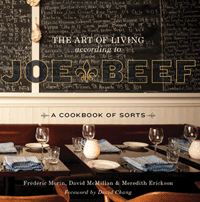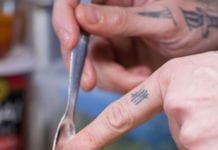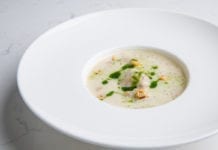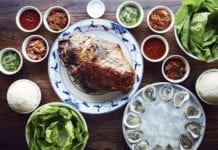F&H chats with Frederic Morin about his unique new cookbook.
Welcome to “Books for Cooks.” This new column will appear in F&H every other month, offering interviews with authors of buzz-worthy cookbooks.
Described on the cover as a “cookbook of sorts,” The Art of Living According to Joe Beef (Ten Speed Press) — by Frédéric Morin, David McMillan and Meredith Erickson — takes readers on an unexpected culinary journey. F&H had a chance to learn more about that quest during a recent interview with chef Morin, who, with chef McMillan, co-owns Joe Beef, Liverpool House and McKiernan Luncheonette in Montreal. Morin’s love of gardening, trains, tinkering in his workshop and French food are represented within the pages of this unconventionally delicious new read. Below he offers a glimpse into the work with musings about his influences.
What’s the most interesting thing you learned about cooking while writing this book?
I learned how to test recipes and follow standards. I really developed respect for using recipes rather than just winging it in the kitchen.
What’s the most surprising lesson you learned while producing The Art of Living?
Because it was [created] with an American publisher, I learned how to use imperial weights and volume. It feels so natural in Canada to use the metric system. It’s so practical.
What’s the book’s most unusual recipe?
The Velveeta éclair with mashed potatoes and foie gras.
What inspired that dish?
As a kid I loved velveeta, and everybody kind of liked it, and I wanted to put it somewhere where it was kind of contradictory [with the foie gras], but, most importantly, kind of delicious.
What do you hope people take away from this book?
I want my sons, Henry and Ivan, to read it when I am old and laugh and be proud.
And, what do you hope readers learn from the cookbook?
I wouldn’t say learn — I would say, get a good laugh. If [readers] decide to do one recipe [I hope they] have fun doing it. It’s not an academic book, it’s not a groundbreaking book; the recipes are not there to change the world. The most recurring comment about the book is that it’s funny.
What cookbooks have influenced you?
Larousse Gastronomique, edited by Robert J. Courtine; Encyclopédie de la Gastronomie Française, from Flammarion; and The Cooking of Provincial France, from Time Life.
How would you describe your cooking philosophy?
It’s French food, rooted in the classics. It’s food that’s really delicious, and, in part, that’s food that we are very close to and linked to. If I am the one fat French guy making yakitori that would be a mismatch. And, you think I’m just a fat French guy making fat French food. So that is a little bit more appropriate.
What advice do you have for other chefs or restaurateurs writing cookbooks?
Put some of your own quirks in it. I don’t want to read any more cookbooks about technique, the seasons, local food or how important dinner service is — that’s all
too obvious.





















